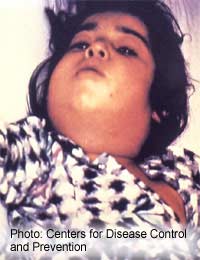Diphtheria and the Throat

Diphtheria is an acute infection of the upper airway. It is highly contagious and must be treated before the symptoms are permitted to escalate which can have a very negative impact on life.It is most commonly passed to others through sneezing, coughing or through contact with mucous; it can also be contracted through skin contact as well though this is less common.
What Causes Diphtheria?
Although most people may have heard of diphtheria and know that it used to be a very common illness in the past, they do not know much about it.It is actually caused by the diphtheria bacterium and other toxins that attack the respiratory system, gradually causing severe respiratory distress and can easily cause death if left untreated.
The bacteria enter the system and grow quite happily among the tissues of the throat which provide a perfect environment as they are dark, moist and warm. As the bacteria multiply, they emit a dangerous toxin that is very hazardous to health as it destroys healthy membranes and replaces them with a covering which can eventually come loose and prevent inhalation and exhalation causing death. Along with this the toxins can be absorbed into the body causing irreparable damage to the cardiac tissues and parts of the nervous system.
Signs And Symptoms
The first stage of diphtheria can cause a sore throat and inflammation of the throat tissues. Along with this discomfort comes along with a cough and head cold often with an increase in temperature.As the disease progresses people find it increasingly difficult to breathe.If left untreated victims of diphtheria can eventually die of lack of oxygen due to a film of membrane that grows over the opening to the airway at the back of the throat. This sheath usually spreads from around the tonsil site of one side to the tonsil on the other side.
If the bacterial toxins affect the skin, small crusty scabs can form that can grow to be quite large and quite deep affecting the deeper layers of tissues.
Treating Diphtheria
In order to make a complete recovery, diphtheria should be treated as a matter of urgency and will often force medical personnel to act because of a hunch or suspicion not waiting until an official diagnosis has been made using blood tests and swabs.Anti-biotic treatment is essential along with receiving specially developed medication that counteracts the toxic effect of the diphtheria bacteria.If you have any problem with breathing, specialist breathing apparatus may be used to assist breathing until the medications have had time to work.
Anyone with suspected diphtheria should inform staff of anyone they have had contact with in the past five days as it can spread so easily and quickly in those who have not been vaccinated.
Preventing Diphtheria
As diphtheria caused so many deaths and illness in the past, it is recommended that everyone is vaccinated against the disease in order to protect themselves.The vaccination involves injecting a very small amount of the disease into a person whose own immunity responds to the tiny dose and creates its own antibodies to the disease should it ever come into contact with it again.
The vaccination programme has worked very well and the incidence of the illness has dropped to virtually none in the Western world.
Diphtheria has been responsible for many epidemics and deaths in the years gone by, but now thanks to vaccination programmes the disease is very rare.
- Can You Still Get Quinsy?
- What Are Throat Polyps?
- Do Probiotic Throat Lozenges Work?
- Mononucleosis Infection and the Throat
- Thrush and the Throat
- What is Quinsy?
- Streptococcus Throat Infections
- Tonsillitis and Your Throat
- Viral Throat Infections
- Bacterial Throat Infections
- All About Pharyngitis
- All About Laryngitis


Re: What is an Adenoidectomy?
My problem may not be related to adenoids. I almost am not sure where to start as it feels like a uncommon problem I have that doctors…
Re: What is an Adenoidectomy?
My problem may not be related to adenoids. I almost am not sure where to start as it feels like a uncommon problem I have that doctors…
Re: I Had a Tooth Out and Lost My Sense of Taste: A Case Study
I had extractions on my bottom an top teeth on 3/10.Swollen chin and left jaw and some dis…
Re: I Had a Tooth Out and Lost My Sense of Taste: A Case Study
So I have had the same experience. Today I called the dentist office back but they advised…
Re: Can You Still Get Quinsy?
I had quinsy for the first time 3 weeks ago . My tonsil was still infamed . So got sent to ent . He said ohhh we will take tonsils out…
Re: Could Cow's Milk Be Causing My Throat Problems?
This thread has been very revealing. I suffer from sore throat quite often. Sometimes it's so painful it…
Re: Ulcers In The Throat
For the last 4 years since diagnosis of AF and the usual blood thinners etc presc. I have had nasty tasting blood stained mouthfuls of…
Re: White Lumps From Throat in Mouth: What Are They?
mere mouth main side white dot aata hai or usko thoda hat lagake nikalenge toh nikalta hai. 8 din bad…
Re: Alcohol and Your Throat
Also my eating is extreme poor but gaining weight. Even was on sertraline and now martizapine with is major depressive disorder. So now…
Re: Alcohol and Your Throat
I need major help. I've been suffering this throat problem for a long time. Really dry mouth. Dry mouth jel does nothing excessive water…